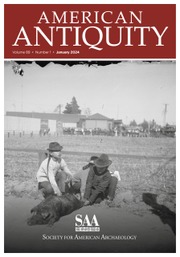Crossref Citations
This article has been cited by the following publications. This list is generated based on data provided by
Crossref.
McGUIRE, MICHAEL T.
1982.
Research Paradigms.
American Behavioral Scientist,
Vol. 25,
Issue. 3,
p.
295.
1982.
Philosophy and Archaeology.
p.
183.
Lowe, John W. G.
1982.
On Mathematical Models of the Classic Maya Collapse: The Class Conflict Hypothesis Reexamined.
American Antiquity,
Vol. 47,
Issue. 3,
p.
643.
Lodge, Milton
and
Wahlke, John C.
1982.
Politicos, Apoliticals, and the Processing of Political Information.
International Political Science Review,
Vol. 3,
Issue. 1,
p.
131.
Glymour, Clark
1983.
Social science and social physics.
Behavioral Science,
Vol. 28,
Issue. 2,
p.
126.
Brody, Charles J.
1983.
Advertising Campaigns as Arms Races.
Sociological Perspectives,
Vol. 26,
Issue. 3,
p.
323.
Whitley, David S.
and
Clark, William A.V.
1985.
Spatial autocorrelation tests and the Classic Maya collapse: Methods and inferences.
Journal of Archaeological Science,
Vol. 12,
Issue. 5,
p.
377.
Kvamme, Kenneth L.
1990.
Spatial Autocorrelation and the Classic Maya Collapse revisited: Refined techniques and new conclusions.
Journal of Archaeological Science,
Vol. 17,
Issue. 2,
p.
197.
LaBianca, Øystein S.
1991.
Food systems research: An overview and a case study from Madaba plains, Jordan.
Food and Foodways,
Vol. 4,
Issue. 3-4,
p.
221.
Valdez, Fred
and
Mock, Shirley B.
1991.
Additional Considerations for Prehispanic Saltmaking in Belize.
American Antiquity,
Vol. 56,
Issue. 3,
p.
520.
Demarest, Arthur A.
1997.
The Vanderbilt Petexbatun Regional Archaeological Project 1989–1994: Overview, History, and Major Results of a Multidisciplinary Study of the Classic Maya collapse.
Ancient Mesoamerica,
Vol. 8,
Issue. 2,
p.
209.
Foias, Antonia E.
and
Bishop, Ronald L.
1997.
Changing Ceramic Production and Exchange in the Petexbatun Region, Guatemala: Reconsidering the Classic Maya Collapse.
Ancient Mesoamerica,
Vol. 8,
Issue. 2,
p.
275.
Neiman, Fraser D.
1997.
Conspicuous Consumption as Wasteful Advertising: a Darwinian Perspective on Spatial Patterns in Classic Maya Terminal Monument Dates.
Archaeological Papers of the American Anthropological Association,
Vol. 7,
Issue. 1,
p.
267.
Lucero, Lisa J.
2002.
The Collapse of the Classic Maya: A Case for the Role of Water Control.
American Anthropologist,
Vol. 104,
Issue. 3,
p.
814.
Aimers, James J.
2007.
What Maya Collapse? Terminal Classic Variation in the Maya Lowlands.
Journal of Archaeological Research,
Vol. 15,
Issue. 4,
p.
329.
Emery, Kitty F.
2008.
A Zooarchaeological Test for Dietary Resource Depression at the End of the Classic Period in the Petexbatun, Guatemala.
Human Ecology,
Vol. 36,
Issue. 5,
p.
617.
Schwarz, Kevin R.
2009.
ECKIXIL: Understanding the Classic to Postclassic Survival and Transformation of a Peten Maya Village.
Latin American Antiquity,
Vol. 20,
Issue. 3,
p.
413.
Turner, B. L.
and
Sabloff, Jeremy A.
2012.
Classic Period collapse of the Central Maya Lowlands: Insights about human–environment relationships for sustainability.
Proceedings of the National Academy of Sciences,
Vol. 109,
Issue. 35,
p.
13908.
Schwarz, Kevin R.
2013.
Through the rearview mirror: Rethinking the Classic Maya Collapse in the light of Postclassic rural social transformation.
Journal of Social Archaeology,
Vol. 13,
Issue. 2,
p.
242.
Golden, Charles
and
Scherer, Andrew K.
2013.
Territory, Trust, Growth, and Collapse in Classic Period Maya Kingdoms.
Current Anthropology,
Vol. 54,
Issue. 4,
p.
397.


